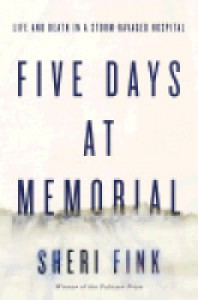twiggreads
 It took me almost a month to get through this book. It's absolutely heart breaking and I needed to stop a lot because I was getting upset and angry.
It took me almost a month to get through this book. It's absolutely heart breaking and I needed to stop a lot because I was getting upset and angry.Five Days at Memorial is the story of a hospital during and after Hurricane Katrina. The only way to describe those five days is 'colossal failure'. I was telling my dad (an RN) about the book and I actually looked up 'colossal' in a thesaurus because I don't think the word is adequate to describe the severity of the events.
Memorial was not prepared for anything like Katrina. The backup generators were in the basement -- below sea level. The emergency handbook section on volcanos was longer than the section on hurricanes. The corporation that owned Memorial, Tenant, pushed the hospital to rely on FEMA and the National Guard. Both agencies were busy with the entire Gulf region. Tenant also prohibited other hospitals in their corporation from assisting (an Atlanta hospital volunteered to send helicopters, personnel, and supplies to assist evacuation). Those systemic failures, in addition to dozens of smaller failures led to numerous patients dying…and several patients being euthanized.
While Fink tells a very, very important story and doing so requires a lot of space, this book is weighed down by a lot of unnecessary details. About a third of the way through, Fink writes about triage. Describing the basic concept of triage and leading into how the doctors at Memorial had no pre-set plan is important. Writing about how the word 'triage' comes from the French sorting coffee beans is not important and it doesn't add anything.
The book straddles the line of a novel (wants to give you as much information as possible) and a case study (only gives you what you need) and the result is 400 dense pages.
I wish Fink wrote more about Charity Hospital. This hospital was mentioned towards the end as a counterpoint for the failure of Memorial. Fink wrote "approximately twice as many patients and fewer than twice as many staff members were present at the public hospital's two campuses as compared with Memorial. However, only three patients died." I think theirs is an important story that we can learn from.


